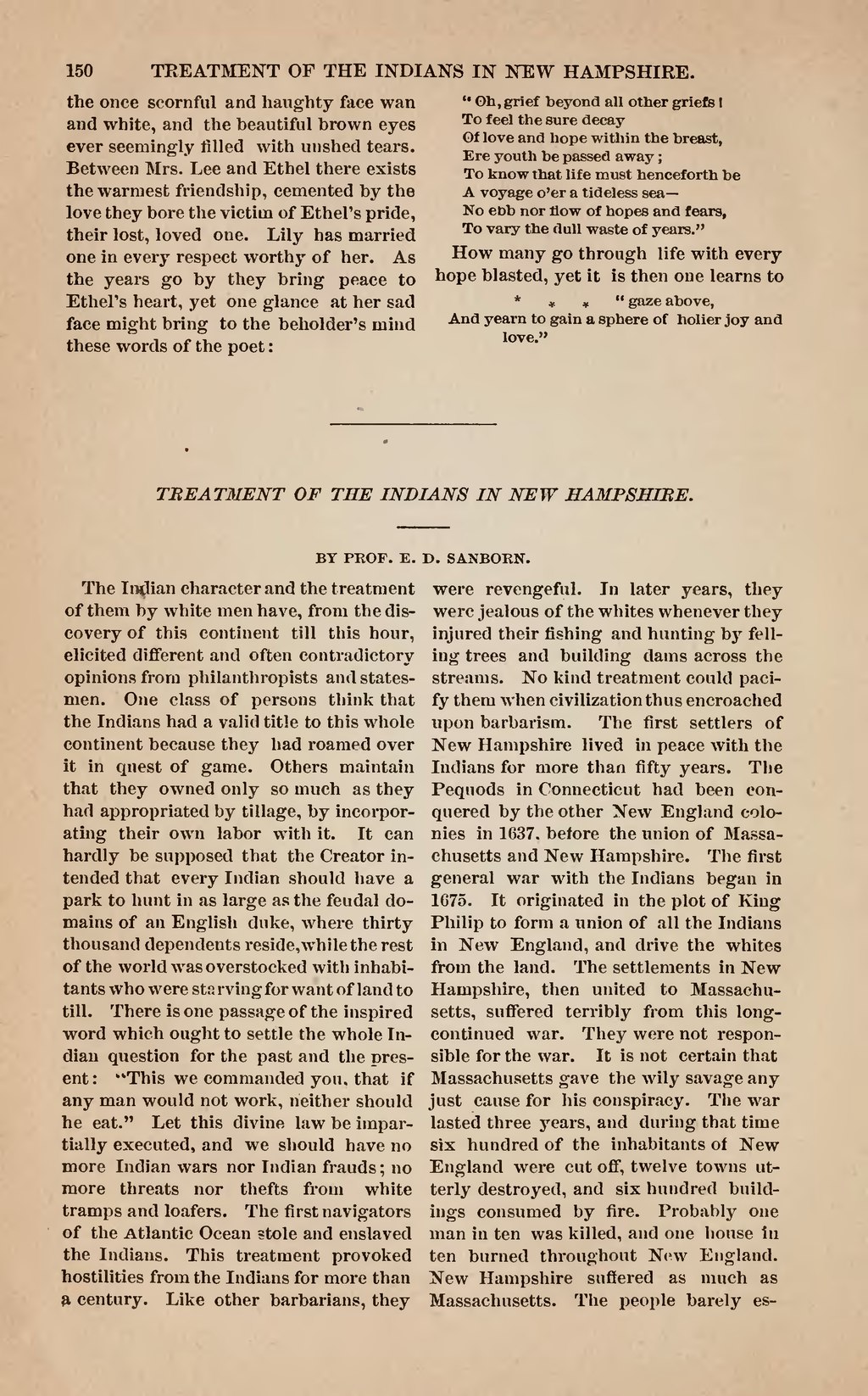150
��TREATMENT OF THE INDIANS IN NEW HAMPSHIRE.
��the once scornful and haughty face wan and white, and the beautiful brown eyes ever seemingly filled with unshed tears. Between Mrs. Lee and Ethel there exists the warmest friendship, cemented by the love they bore the victim of Ethel's pride, their lost, loved one. Lily has married one in every respect worthy of her. As the years go by they bring peace to Ethel's heart, yet one glance at her sad face might bring to the beholder's mind these words of the poet :
��" Oh, grief beyond all other griefs I
To feel the sure decay
Of love and hope within the breast,
Ere youth be passed away ;
To know that life must henceforth be
A voyage o'er a tideless sea—
No ebb nor flow of hopes and fears,
To vary the dull waste of years."
How many go through life with every
hope blasted, yet it is then one learns to
- * * " gaze above,
And yearn to gain a sphere of holier joy and love."
��TBEATMENT OF THE INDIANS IN NEW HAMPSHIRE.
��BY PROF. E. D. SANBORN.
��The Indian character and the treatment of them by white men have, from the dis- covery of this continent till this hour, elicited different and often contradictory opinions from philanthropists and states- men. One class of persons think that the Indians had a valid title to this whole continent because they had roamed over it in quest of game. Others maintain that they owned only so much as they had appropriated by tillage, by incorpor- ating their own labor with it. It can hardly be supposed that the Creator in- tended that every Indian should have a park to hunt in as large as the feudal do- mains of an English duke, where thirty thousand dependents reside,whilethe rest of the world was overstocked with inhabi- tants who were sta rving for want of land to till. There is one passage of the inspired word which ought to settle the whole In- dian question for the past and the pres- ent : "This we commanded you. that if any man would not work, neither should he eat." Let this divine law be impar- tially executed, and we should have no more Indian wars nor Indian frauds ; no more threats nor thefts from white tramps and loafers. The first navigators of the Atlantic Ocean stole and enslaved the Indians. This treatment provoked hostilities from the Indians for more than a century. Like other barbarians, they
��were revengeful. In later years, they were jealous of the whites whenever they injured their fishing and hunting by fell- ing trees and building dams across the streams. No kind treatment could paci- fy them when civilization thus encroached upon barbarism. The first settlers of New Hampshire lived in peace with the Indians for more than fifty years. The Pequods in Connecticut had been con- quered by the other New England colo- nies in 1637, before the union of Massa- chusetts and New Hampshire. The first general war with the Indians began in 1675. It originated in the plot of King Philip to form a union of all the Indians in New England, and drive the whites from the land. The settlements in New Hampshire, then united to Massachu- setts, suffered terribly from this long- continued war. They were not respon- sible for the war. It is not certain that Massachusetts gave the wily savage any just cause for his conspiracy. The war lasted three years, and during that time six hundred of the inhabitants of New England were cut off, twelve towns ut- terly destroyed, and six hundred build- ings consumed by fire. Probably one man in ten was killed, and one house in ten burned throughout New England. New Hampshire suffered as much as Massachusetts. The people barely es-
�� �
